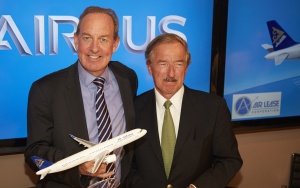Air Astana selects Airbus A320 for fleet expansion
 Air Astana president Peter Foster signs with Steven Udvar-Házy, chairman, Air Lease Corporation
Air Astana president Peter Foster signs with Steven Udvar-Házy, chairman, Air Lease Corporation Air Astana, the Kazakh flag carrier, has signed a deal for seven Airbus A320neo family aircraft, comprising two A320neo, one A321neo and four A321neo Long range.
The new aircraft will be acquired on operating leases basis from Air Lease Corporation of Los Angeles, USA.
One A320neo is scheduled for delivery in spring 2016, with the remaining six aircraft being delivered in 2018 and 2019.
The new fleet of A320neo family aircraft will operate on the airline’s domestic network, as well as international services to destinations in China, India, Russia and the UAE.
Additionally, the A321neo LR has the capability to operate on longer routes including those from Astana to London and from Almaty to Bangkok, Ho Chi Minh City and Hong Kong.
ADVERTISEMENT
The A320neo cabin will be configured with 16 Business Class, 132 Economy Class seats, the A321neo with 28 Business Class, 151 Economy Class seats and the A321neo LR with 16 lie flat Business Class seats, 150 Economy Class seats.
All new aircraft are planned to be equipped with individual In-flight entertainment systems in both Business and Economy Classes.
“The Airbus A320 has proved to be a tremendous success in service with Air Astana over the past nine years, with enormous passenger appeal, low operating costs, high reliability and an outstanding safety record,” said Peter Foster, president, Air Astana.
“The new generation A320neo family aircraft offer significant improvements to passenger cabin comfort, fuel economy and operating capability, particularly on long range routes to Asia and Europe.”
Air Astana commenced regular flight operations on May 15th 2002 and currently operates a network of 64 routes between 39 international and domestic destinations.
Air Astana is a joint venture between Kazakhstan’s national wealth fund, Samruk Kazyna, and BAE Systems, with respective shares of 51 per cent and 49 per cent.

